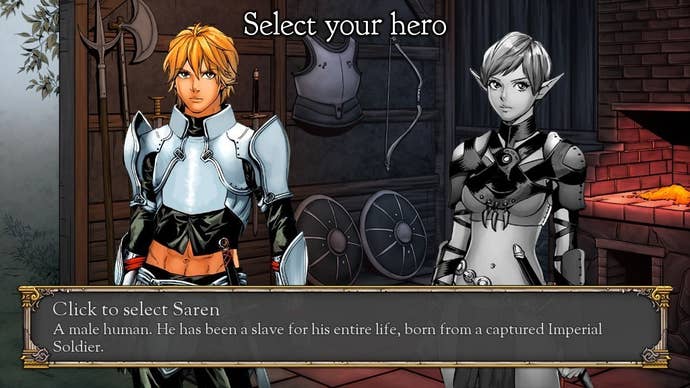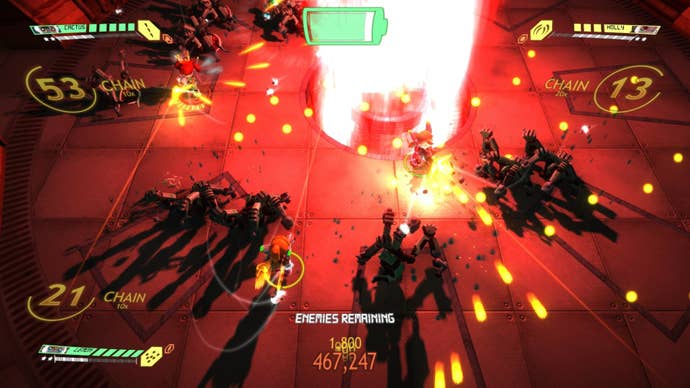What Do Developers Think of Steam Tags?
While a good idea in principle, the Steam Tags system has had some teething troubles since launch. But what do the devs think?
This article first appeared on USgamer, a partner publication of VG247. Some content, such as this article, has been migrated to VG247 for posterity after USgamer's closure - but it has not been edited or further vetted by the VG247 team.
Open anything up to the Internet with minimal restrictions and one of the first things that will happen is that the boundaries will be tested.
Steam's new Tags system was certainly no exception, with games being tagged with everything from "bad" to "The Holocoast [sic] Never Happened." Certain games that had proven to be somewhat divisive -- particularly those praised by professional critics but disliked by certain parts of the gaming public, such as The Fullbright Company's Gone Home -- found themselves overwhelmingly branded with negative tags such as "not a game" to such a degree that these descriptors were showing up on the games' Steam Store pages.
Part of the problem stemmed from the unmoderated nature of Steam Tags when the system launched. Anyone could tag any game, regardless of whether or not they had played it or even owned it. This naturally led to some of the more unpleasant members of Steam's online community taking it upon themselves to try and "legitimize" their opinions of various games through the tagging system. Since that time, Valve has acknowledged the concerns of more upstanding members of the community and added the facility for tags to be "downvoted" on any of four grounds: the tag is offensive; the tag is not appropriate or applicable to the product in question; the tag is not helpful to the community; or the tag is a spoiler. This is a good start, but those attempting to use the system properly are still keen to see Valve implement restrictions on who can tag what -- i.e. those who don't own a game shouldn't be able to tag it -- and for the company to replace the Steam client's current Category system with the new Tags functionality.
There's still definitely work to do from an end-user perspective, then, but what do the developers whose games are being affected by this new system think? I reached out to a selection of individuals, largely from the independent space, to see what they thought.
Gone Home creator Steve Gaynor noted that he believed the system to be too early in its life for him to comment in detail, despite his game having received some less than complimentary tags shortly after the system went live. Similarly, Thomas Was Alone and Volume creator Mike Bithell chose to abstain from commenting on the grounds that he didn't feel he had an adequate solution for the problems evident in the system's early days.

Paul Taylor from Frozen Synapse and Frozen Endzone developer Mode 7 Games had something to say, however.
"Discovery is overwhelmingly the number one problem that indie games have," he said. "We don't have the marketing budget to address more than a tiny fraction of our possible audience, so new ways for people to discover games should be praised to high heaven, particularly on Steam."
Amid the negativity surrounding the system's launch, this is an important thing to remember: as systems like Steam Greenlight grow in popularity and more and more games start to make it onto Valve's platform, developers of new games -- particularly small games without a lot of money to spend on promotion -- can no longer solely rely on Steam's front page for people to find their games. The tagging system can, in theory at least, allow people to find other, similar experiences to those they have enjoyed in the past -- assuming it's used correctly, of course.
"It really disappoints me that the usual nitpicking idiocy from the gaming community has become prevalent during the launch of this," Taylor continued. "It's a beta, of course people are going to start trolling and abusing it from the outset; I'm sure Valve are perfectly able to cope with processing that. Their policy is to launch and gather data so they can make informed choices: I don't think anyone's going to be harmed by silliness like people tagging their game as 'bad' or whatever in the meantime."
It's a fair point; I doubt Activision is losing much sleep over Modern Warfare 3, the two Black Ops games and Ghosts having tags such as "horrible," "bribed reviewers" and "poor quality" attached to their games, though big-budget games like that will often sell on the name alone; smaller indie games have to rely more on community and word-of-mouth features such as Steam Tags and user reviews.
"It's intriguing that they've added negative or pejorative tagging," added Taylor. "I'm simply interested to see where that goes. I suppose it does concern me that people might get the wrong end of the stick and start tagging things erroneously, but again I think Valve want to position themselves as community curators rather than Steam's officiating body, so there are aspects of this that everyone has to work out together. I'm actually quite excited for the community-driven future in general: I'm currently seeing things like more traffic coming to our Frozen Endzone site from Twitter and Reddit than from any articles on big gaming sites, which hasn't been true before, so a new method of sharing stuff is great."

Winter Wolves' Celso Riva, whose visual novel-cum-dating-sim-cum-RPG Loren the Amazon Princess hit Steam not long ago (USG review coming soon!), had some strong feelings on the subject.
"I think [Steam Tags] is a great idea, with some corrections," he said. "There must be a good filter for the tags used, to avoid abuse by some users.
"It's good, because it lets you filter each game. For example, let's say I want a turn-based visual novel RPG hybrid game in a fantasy setting with manga artwork and romance including LGBT content? With tags, you could easily find my game Loren, because currently most of those tags are added -- so it can help people find exactly what they're looking for, much better than generic categories."
There's a lot of truth in that, for sure -- tagging opens up the possibility for searching by things other than game name, developer and genre, for example -- assuming games are tagged appropriately, they'll open up the option for searching by thematic content, art style, language and all manner of other things, leading to greater flexibility in searching and, as a result, as Taylor noted, greater discoverability for developers putting together more niche titles.
"However, and here comes the problem," continued Celso, "users abuse it. You see many games with tags like 'garbage, bad, waste of money, useless, terrible, horrible.' Let's ignore the fact that is pretty insulting for the developers. Even if they weren't, does anyone think that they'll be looking for a bad game? Or a waste of money? Or garbage? They're useless; that's the problem. Such tags serve no purpose, so they could easily be removed by Valve."
Alfe Clemencio from anime-inspired visual novel developer Sakura River concurred with Celso, noting that "the new tag feature gives a lot more exposure for niche yet still sizable markets, like the anime game market. They just need a bit of tweaking -- and Valve should be vetoing tags that aren't useful for the gamers."
There's an interesting point raised here: what is a "useful" tag? Is a tag that effectively functions as a one-word review as useful as a more factual tag that helps pin down what kind of game a title is, or its thematic content, or whether it has split-screen, or any number of other things? Tags are not the same thing as reviews, and Steam's current Recommendation system allows its users to share their opinions on games (and attach more detailed thoughts if they desire) -- so should tags be kept as something a little more fact- rather than opinion-based? And, if so, how can that be managed?

Sanatana Mishra of Witch Beam Games, developer of Assault Android Cactus, meanwhile, felt fairly positively about the whole thing.
"It fits right in with Valve's long term plans of a community driven ecosystem and it's a step in the right direction for discovery now that the platform is being flooded with games," he said. "There [have been] some teething problems, mostly to do with trolling of popular games, but I think Valve's response is pretty much what I was expecting with the self correcting methods. It's very similar to the way they have approached Dota 2 with the community being largely responsible for determining the validity of a tag and Valve only stepping in when it's clear people find a tag to be in very poor taste.
"Lately I've been really impressed with Valve's long term thinking," Mishra continued. "Systems like this scale very well without the need for additional staff oversight and are always going to be more up to date, accurate, and useful than whatever a developer or publisher could provide as they are driven by the very people who use the platform and play the games. When Steam is truly an open platform I think we'll look back on this as one of the many ways they addressed decentralized discovery, and when you combine it with the user review system it's a great way to get a snapshot of the community's opinion on a game. Plus who wouldn't want their game tagged as 'Underrated' and 'Hnnng?'"
Mishra brings up something important here: Valve has provided plenty of evidence over the years that they want the Steam community to be self-sufficient, for want of a better term. The new features that have been added to Steam's community aspect over time have increased the importance and usefulness of the service's social aspects without intruding on the experience of those who simply want to use it as a means of buying and launching games. It's clear that Valve's somewhat Utopian vision of the future for features such as Steam Tags and Recommendations is a world where organized trolling and abuse will be counterbalanced -- outweighed, even -- by people using these aspects of the service as intended. There's still clearly some work to be done -- hence the necessity of newly added features such as tag downvoting and the like -- but wouldn't it be nice to live in a world where The Internet can be trusted to paint an accurate, helpful picture of something? That's what Valve's shooting for.
What do you think of Steam Tags, readers? Have you found them to be a useful means of discovering new games, or does the system need a rethink?
